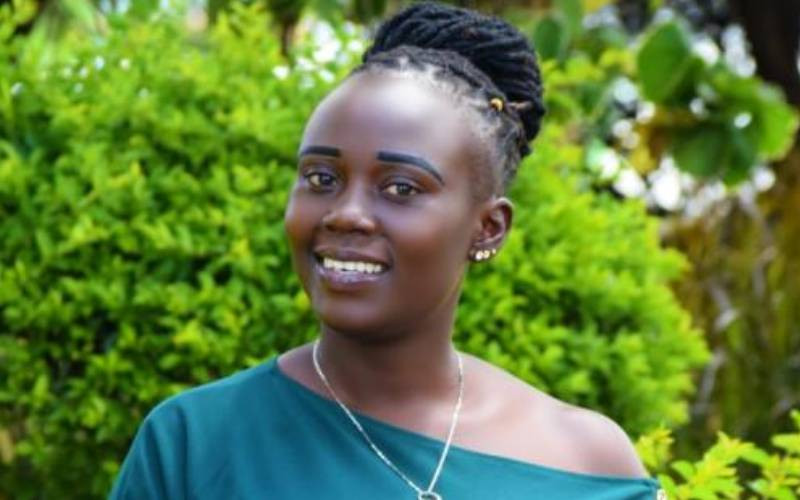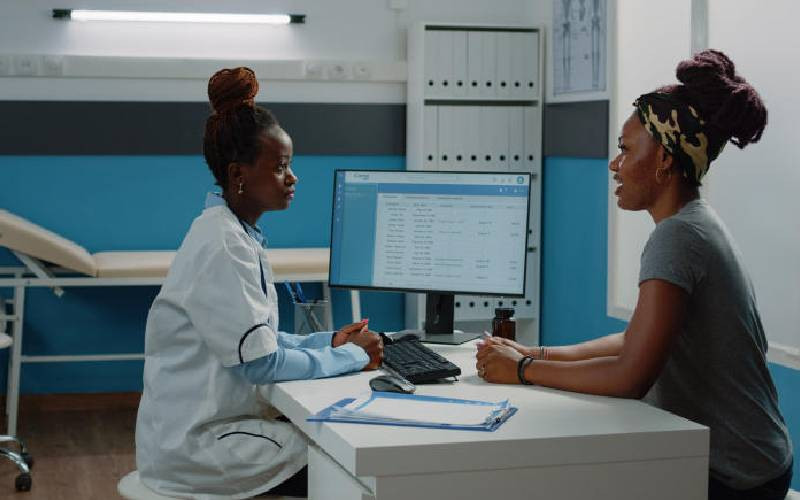
Abel Akiror shows his daughter Vivian Asere's affected leg.
It was meant to be an injection to cure malaria, but within an hour of receiving the jab, Cate Ateng’e’s life changed forever.
Cate, then a six-year-old girl full of life, had developed high fever and was sweating profusely. Her father Emmanuel Omonya immediately took her to Akichelesit dispensary in Teso North, Busia County, about 15 kilometres away from their home.
It was a journey that would plunge the family into untold misery.
The nurse on duty immediately diagnosed her with malaria and gave her an injection, Mr Omonya says.
Within an hour, Cate’s condition was getting worse.
“She was crying and writhing in pain. When I took her back to the dispensary, I was given drugs to assuage the pain. They never worked,” said Mr Omonya.
Cate is one of the 28 children who were left permanently disabled following toxic injections administered to them at Akichelesit dispensary in 2015.
Stiff knee
Some of them were left with permanent physical disability that affected their ability to walk, while others became mentally challenged. The 28 had to be airlifted to Nairobi for specialisied treatment.
Life has never been the same for them and their parents since then. Cate’s left leg was paralysed. A medical report dated August 5, 2015 shows she had a stiff knee with post injection paralysis. The leg has remained stiff even after it was operated on at the Nairobi Hospital.
“I cry when I see my daughter suffering. Going to the latrine is a problem because she cannot fold the knee,” said Omonya.
She uses crutches to support herself and has to trek the 700 metres from her home to St Mary’s Primary School. It is a painful 25-minute journey.
Every morning, her grandmother Christine has to massage her leg with milking jelly. It helps soften the tissue and reduces her pain, albeit slightly.
Omonya says his family has suffered immensely since that day in 2015. His wife miscarried and died last year. He blames it on the stress that came with Cate’s disability.
Cate, now 10, has had to repeat Class Two three times. Because of the paralysis on her leg, her schooling is an on-and-off affair.
Evalyne Barasa is a single parent. Her two children, Gideon Wekesa, 12, and Shielda Nekesa, 10, were victims of the botched injection, which affected their backs and left legs.
She remembers that day like it was yesterday. When they started experiencing severe pain, she took them back to the dispensary.
“The nurse asked me to go back home, boil water, pour it in a glass bottle and place it at the exact part they were injected to reduce the pain,” Ms Barasa told The Standard. “The injection turned the lives of my children upside down. I regret taking them to that facility.”
Gideon and Shielda’s left legs have been half paralysed since then. Though they do not use crutches, walking is a painful struggle. Their mother has to massage the legs with jelly to soften the muscles.
They cannot play like their peers, and they cannot participate in any physical activities in school. Gideon will be joining Class Eight next year while Shielda will be in Class Seven at Kekalet Primary School, about a kilometre away from their village.
Abel Okiror took his daughter Vivian Asere for treatment at Akichelesit dispensary on May 18, 2015. After the injection, the young girl started showing the same adverse symptoms as Cate, Gideon and Shielda.
He went back to the facility to ask why his child was crying and complaining.
“The nurse told me not to panic, that my child would be fine. I had to take her to Angurai Health Centre but we did not receive help until she was flown to Nairobi for treatment,” said Okiror.
Vivian’s right leg and the right part of her body was left permanently paralysed, and her sole is curved towards the left. Now a 10-year-old, she has to drag her right leg along as she walks to Adanya Primary where she is a Class Three pupil.
Pamela Omekede’s son Zakayo Onyapidi, 10, is now physically disabled. His left leg is paralysed. Life for him has become a painful struggle of trying to fit in with his peers. He cannot play as they do, neither can he engage in the physical activities 10-year-old boys do.
He attends the same school as Cate.
Edgar Juma, 15, will be joining secondary school next year. But there is a problem. The nearest school is about two kilometres away from his home in Ketebat village.
Delayed compensation
Edgar suffered permanent physical disability after an injection at Akichelesit dispensary. “My worry is how he will be commuting to the school because he has difficulty walking,” said Brendah Akisa, his mother.
But even as the 28 children and their families struggle with their new conditions, a compensation package due to them as ordered by a court is yet to be paid.
The court directed that the victims of the botched injections be compensated Sh42 million by the County Government of Busia.
But the ruling is yet to be executed as the children continue to suffer in silence, with majority of them losing hope of receiving specialised medication due to the high cost of treatment.
Ironically, the county has been providing for the money in its budget; money that is never released.
“It is unfortunate for a child born without any disability to wake up and find himself in that state. He is likely to suffer mental anguish,” the then Busia Resident Magistrate Josephine Maragia said in her 2017 ruling.
Ms Maragia ruled that the children were victims of professional negligence as proper diagnosis was not done and whoever injected them was not a competent medical practitioner.
 The Standard Group Plc is a multi-media organization with investments in media platforms spanning newspaper print
operations, television, radio broadcasting, digital and online services. The Standard Group is recognized as a
leading multi-media house in Kenya with a key influence in matters of national and international interest.
The Standard Group Plc is a multi-media organization with investments in media platforms spanning newspaper print
operations, television, radio broadcasting, digital and online services. The Standard Group is recognized as a
leading multi-media house in Kenya with a key influence in matters of national and international interest.











